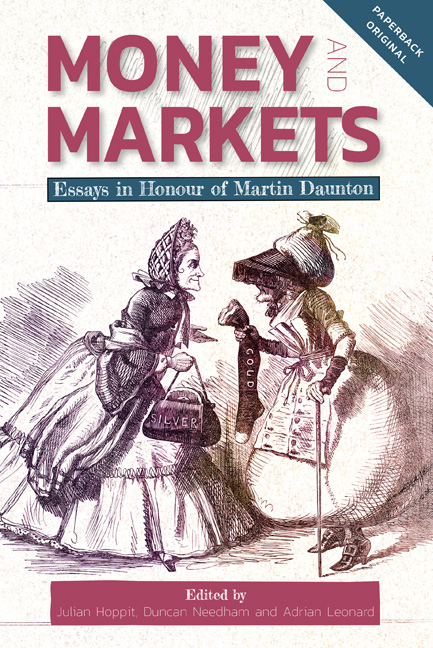Book contents
- Frontmatter
- Contents
- List of Figures
- List of Tables
- List of Contributors
- List of Abbreviations
- Introduction
- 1 Taxing London and the British Fiscal State, 1660–1815
- 2 Rents, Squalor, and the Land Question: Progress and Poverty
- 3 Marine Insurers, the City of London, and Financing the Napoleonic Wars
- 4 The Political Economy of Sir Robert Peel
- 5 Champagne Capitalism: France’s Adaptation to Britain’s Global Hegemony, 1830–80
- 6 The 1848 Revolution in Prussia: a Financial Interpretation
- 7 Imperial Germany, Great Britain and the Political Economy of the Gold Standard, 1867–1914
- 8 Knowledge, Contestation and Authority in the Eurodollar Market, 1959–64
- 9 Continuity and Change in British Conservative Taxation Policy, c. 1964–88
- 10 Britain Since the 1970s: a Transition to Neo-Liberalism?
- 11 Maplin: the Treasury and London’s Third Airport in the 1970s
- 12 Workfare and the Reinvention of the Social in America and Britain, c. 1965 to 1985
- 13 Charity and International Humanitarianism in Post-War Britain
- 14 Discounting Time
- 15 The Material Politics of Energy Disruption: Managing Shortages Amidst Rising Expectations, Britain 1930s–60s
- The Published Writings of Martin J. Daunton
- Index
- People, Markets, Goods: Economies and Societies in History ISSN: 2051-7467
11 - Maplin: the Treasury and London’s Third Airport in the 1970s
Published online by Cambridge University Press: 13 April 2021
- Frontmatter
- Contents
- List of Figures
- List of Tables
- List of Contributors
- List of Abbreviations
- Introduction
- 1 Taxing London and the British Fiscal State, 1660–1815
- 2 Rents, Squalor, and the Land Question: Progress and Poverty
- 3 Marine Insurers, the City of London, and Financing the Napoleonic Wars
- 4 The Political Economy of Sir Robert Peel
- 5 Champagne Capitalism: France’s Adaptation to Britain’s Global Hegemony, 1830–80
- 6 The 1848 Revolution in Prussia: a Financial Interpretation
- 7 Imperial Germany, Great Britain and the Political Economy of the Gold Standard, 1867–1914
- 8 Knowledge, Contestation and Authority in the Eurodollar Market, 1959–64
- 9 Continuity and Change in British Conservative Taxation Policy, c. 1964–88
- 10 Britain Since the 1970s: a Transition to Neo-Liberalism?
- 11 Maplin: the Treasury and London’s Third Airport in the 1970s
- 12 Workfare and the Reinvention of the Social in America and Britain, c. 1965 to 1985
- 13 Charity and International Humanitarianism in Post-War Britain
- 14 Discounting Time
- 15 The Material Politics of Energy Disruption: Managing Shortages Amidst Rising Expectations, Britain 1930s–60s
- The Published Writings of Martin J. Daunton
- Index
- People, Markets, Goods: Economies and Societies in History ISSN: 2051-7467
Summary
The chapters in this volume each relate to one of the ‘four Martin Dauntons’ mentioned in the Introduction. In focusing on an episode of transport history, this chapter goes further back, to Martin's PhD supervisor, Theo Barker. In his appreciation of Barker's career, Martin wrote: ‘in Theo's hands history is always human; it is about people making decisions in institutional, economic or political circumstances’. As the debate over Heathrow expansion illustrates, there are few more political decisions than choosing where to locate new airport capacity. The debate was particularly fierce in the 1970s, when the Heath government rejected the findings of the then most expensive public inquiry, the Roskill Commission, and announced that London's third airport would be built on reclaimed land at Maplin Sands in the Thames Estuary. Situated nearly fifty miles from central London, Maplin was the most expensive of the four options shortlisted by Roskill. It was also the least attractive to the airlines. Three years later, with the Maplin Development Corporation having already commenced work on an artificial island, the successor Labour government scrapped the project.
This chapter begins with a brief outline of the post-war debate over the location of London's third airport. It then draws upon Prime Ministerial, Cabinet, and Treasury documents to explain why the Heath government overrode the Roskill Commission to choose Maplin, and why the project was subsequently abandoned. The Treasury was opposed to Maplin from the outset. Nonetheless, the department was criticised for its handling of the venture. In 1974, just before Maplin was written off, former Ministry of Transport economist Christopher Foster argued that Treasury officials had ‘failed to perform their function’ of scrutinising a major public expenditure project. Former Board of Trade official John Heath further suggested that Maplin was symptomatic of an inability to manage infrastructure projects characterised by ‘a long delay between decision and execution, considerable uncertainty, large scale, and government domination’. Did the Treasury fail with Maplin? And what are the lessons for the management of large infrastructure projects today?
The debate over London's third airport
In the immediate post-war years, London was served by seven different airfields: Blackbushe (Hampshire), Bovingdon (Hertfordshire), Croydon, Gatwick, Heathrow, Northolt, and Stansted.
- Type
- Chapter
- Information
- Money and MarketsEssays in Honour of Martin Daunton, pp. 199 - 216Publisher: Boydell & BrewerPrint publication year: 2019

